How to: FIX Error 114 with GameGuard (Initialization Fail)
The ‘Initiatialization error 114′ occurs with games that are using the nProtect GameGuard anti-cheating engine. Typically, this error pops up seconds after Windows users launch certain games that are using the nProtect GameGuard rootkit.
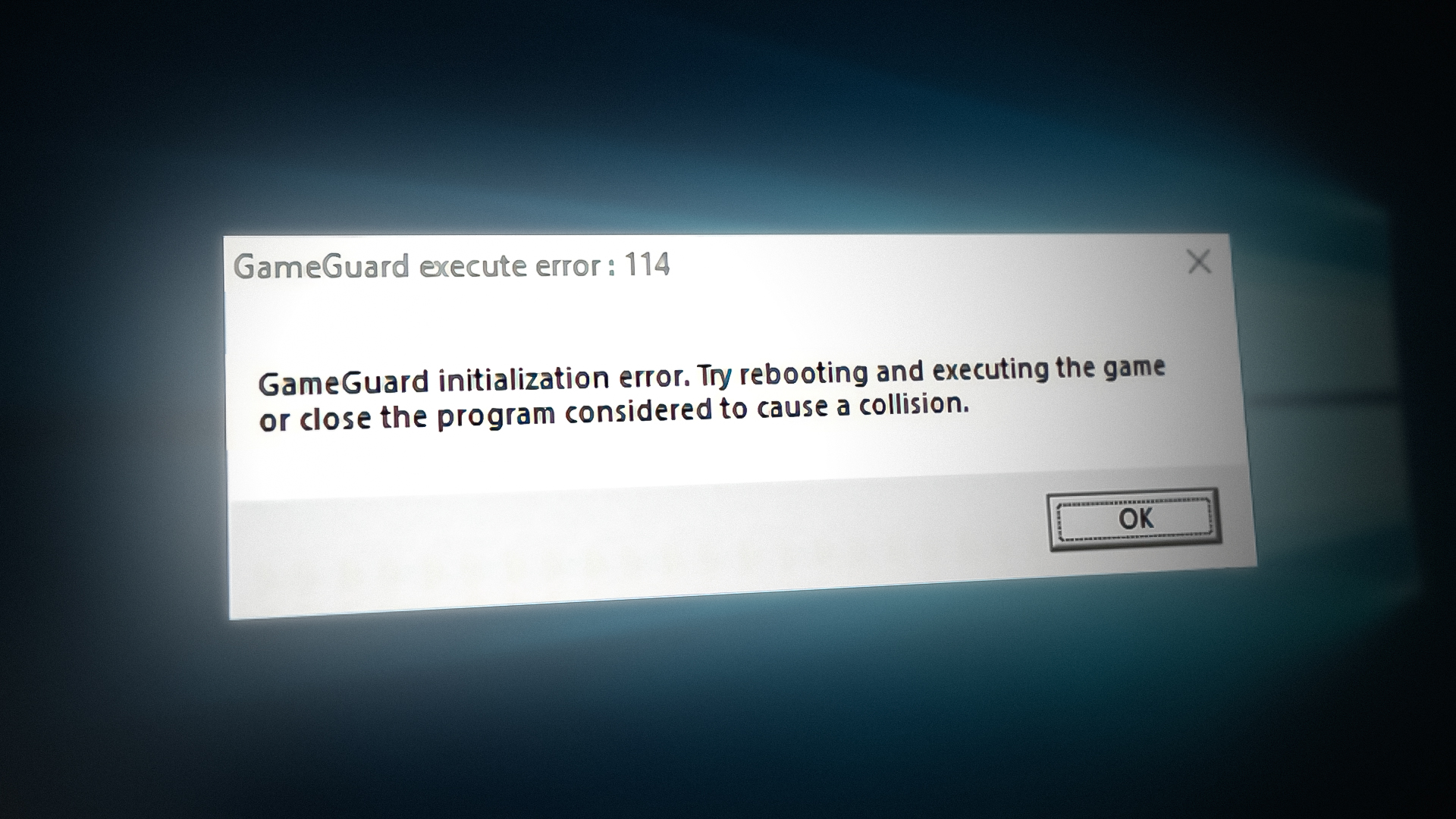
Note: nProtect INCA Internet developed the anti-cheating rootkit GameGuard, also known as GG. It is commonly deployed in numerous online games in order to block potentially dangerous exploits and prevent common cheating techniques. GameGuard uses rootkits to prevent the execution of cheat software.
GameGuard conceals the game application process, monitors the entire memory range, terminates applications, blocks specific calls to Direct X functions and Windows APIs, logs keyboard input for improper behavior, and self-updates as new potential threats emerge.
But because GameGuard functions effectively as a rootkit, players may encounter unforeseen and perhaps undesirable side effects.
The most common scenario is a common glitch that occurs when GameGuard has not been shut down properly. Other potential scenarios that will spawn this error include: spyware interference, missing a security update, collision with another program, or corrupted GameGuard installation.
Here’s a list of confirmed methods that other affected users have successfully used to get past the Initialization fail (Error code 114)
1. Reboot the system
Because it’s functioning like a rootkit closely tied to the game, GameGuard will often throw the Initialization Fail (114) error whenever the game it’s attached to is closed unexpectedly.
If you’re just starting to troubleshoot the issue, the first thing you need to do is reboot your system and fix the common instance where GameGuard has not been shut down properly.
With a lot of game titles protected by nProtect GameGuard (especially legacy titles), you can expect to see this error with every installed game that uses this rootkit until you reboot your system and allow the anti-cheat engine to reinitialize.
If you haven’t tried this already, and you experience this issue with every game that uses GameGuard, simply reboot your system and see if the Initialization Fail (114) error is fixed at the next startup.
2. Run the game launcher with admin access
If you experience this issue with one or two games that are protected by Game Guard, you might be dealing with a permission issue. Because this anti-cheat engine is acting as a rootkit, it needs admin access to access all the required dependencies.
A lot of users have experienced this issue with legacy game titles because a deprecated DirectX dependency was not accessible.
If you get the ‘Initialization error 114′ every time you launch a particular game, try forcing it to launch with admin access and see if the issue is bypassed.
To test if you’re dealing with a permission issue, right-click on the game (or the game’s launcher) that’s throwing the error and click on Run as administrator from the context menu.
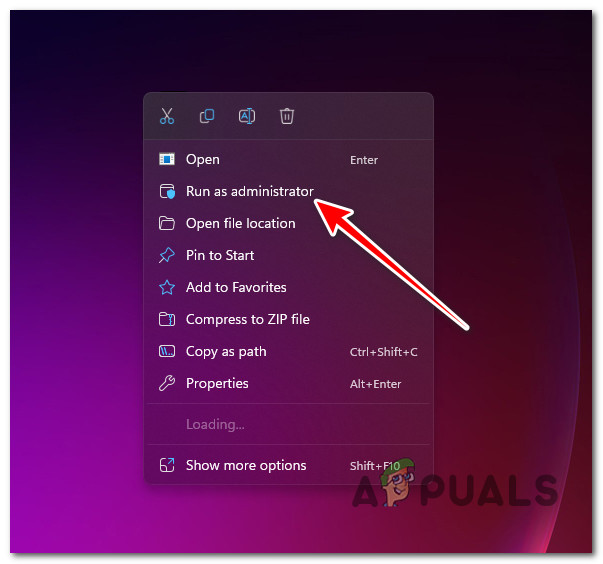
Note: When prompted by the User Account Control (UAC), click Yes to grant admin access.
If the game launches without issues once you’ve successfully forced admin access, you’ve successfully resolved the permission issue.
However, you will need to repeat this action every time you launch the game, unless you follow the steps below to reconfigure the game’s executable to always launch with admin access:
- Right-click on the game that was previously triggering the ‘Initiatialization error 114‘.
- From the context menu that just appeared, click on Properties.
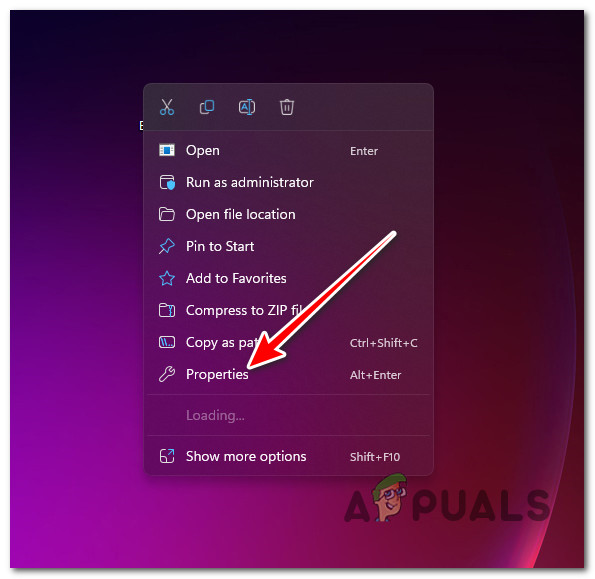
Accessing the properties screen - Inside the Properties screen, click on the Compatibility tab, then go under Settings and make sure that the checkbox associated with Run this program as an administrator is enabled.
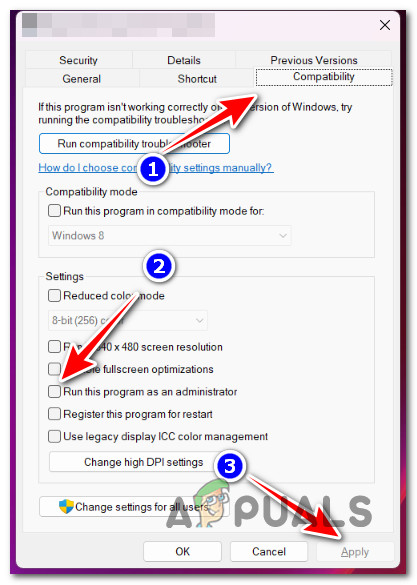
Running the program with admin access - Click on Apply to Save the changes.
3. Install the latest Security update
Looking back, GameGuard has a rocky history if we’re referring to the sheer amount of security updates that ended up causing the anti-cheat engine to malfunction.
It’s not uncommon to see the ‘Initialization error 114′ because of a collision with a Windows Security update that prevents the anti-cheat game engine from accessing certain dependencies.
This has happened numerous times in the past and every time the issue gets rectified by a Windows Security update that fixes the collision.
If this scenario is applicable, all you need to do to fix this issue is to access the Windows Update menu and ensure that you have every security update installed.
Follow the instructions below for specific instructions on how to update your Windows version to the latest build:
Note: The instructions below will work with every recent Windows version.
- Start by pressing the keyboard shortcut Windows key + R to launch the Run dialog box.
- To open the Windows Settings menu, enter “ms-settings:” and hit Enter.
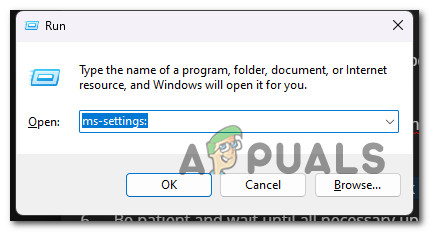
Access the Settings menu of Windows Note: If User Account Control requests administrative authority, select “Yes.”
- Select Windows Update from the menu on the left side of the Settings screen.
- On the subsequent page, select Check for Updates to determine if any updates need to be installed.
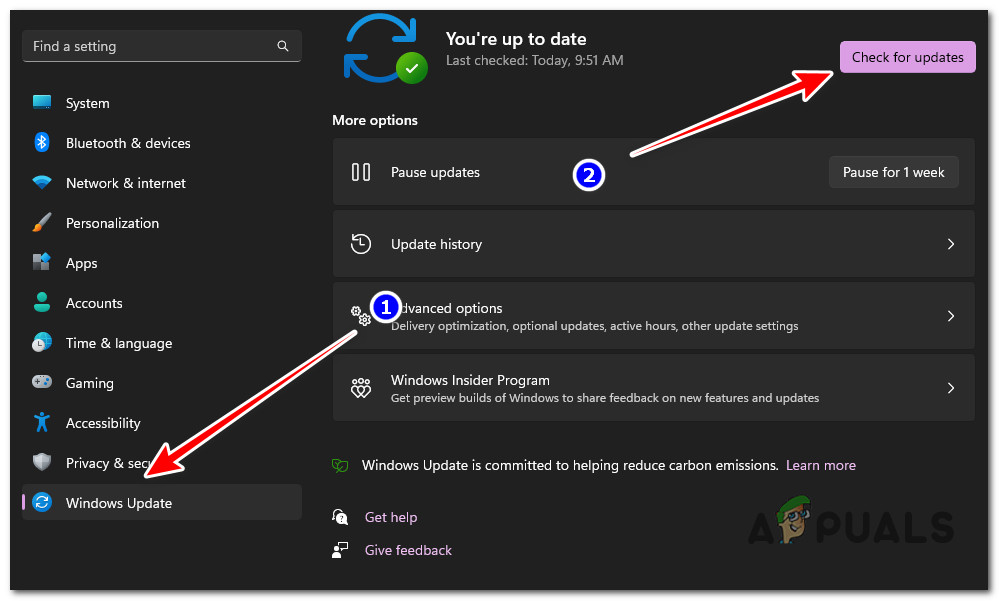
Accessing the Windows Update screen Note: Install every pending update even if you don’t see any mention of a security update. Microsoft has a tendency of pushing security updates with cumulative updates without mentioning them in the change log
- Click Download & Install, if the driver is ready for installation.
Note: Be patient and wait for all required updates to be installed. Depending on the update, it may be necessary to restart your computer for the changes to take effect. - Restart your computer and relaunch the game that was previously triggering the 114 error to see if the problem is now fixed.
4. Disable or Uninstall 3rd party antivirus (if applicable)
There are certain AV suites & firewalls that are not very friendly with the rootkit-like architecture that GameGuard has. AVG and Comodo antivirus are two prime examples of 3rd party AV suites that are not very accommodating to GameGuard.
If you use a 3rd party AV suite (with or without a firewall component) and you see this error with every game that uses the GameGuard anti-cheat engine, this is probably the reason why you see the ‘Initiatialization error 114′ message after every failed attempt.
Note: If you are not utilizing a third-party security suite, you can skip this step and proceed to the one following. It is not confirmed that Windows Defender caused this issue.
If you are using AVG, Comodo, or any other 3rd party suite, disable it temporarily and see if you can launch your games normally.
In most cases, you can disable the problematic AV simply by right-clicking the taskbar icon and clicking on Disable real-time protection from the context menu.
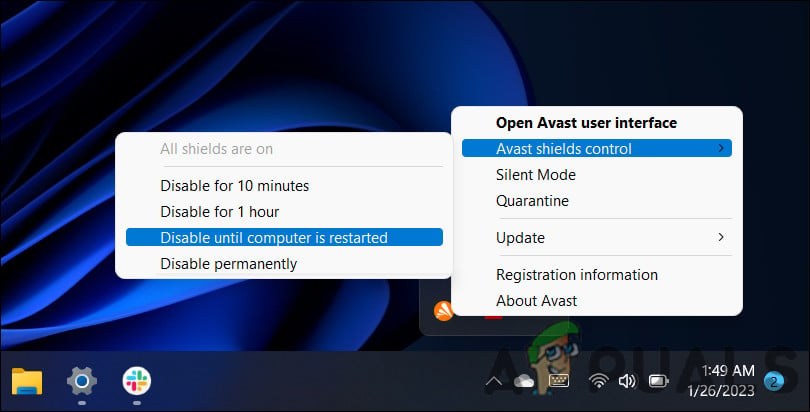
Note: Make sure you disable it for a set number of minutes (or permanently) to ensure that you can restart without the shields clicking back into action. The exact menus will be different from AV to AV. In some cases, you won’t be able to disable the AV directly from the taskbar menu and you’ll need to access the dedicated settings.
After you disabled the active 3rd party AV, reboot your PC and see if you can launch the game that was previously triggering the 114 error once the next startup is complete.
Important: If the 3rd party AV component includes a firewall, you will likely not be able to solve the issue just by disabling the AV part. In this case, you will need to either whitelist the entire GameGuard installation inside your firewall settings (instructions below) or you’ll need to uninstall the 3rd party app altogether.
If you prefer the latter, ensure that you perform a complete uninstall of the security program so you don’t leave behind any remnant files that can produce the same behavior.
5. Add Gameguard Execution files to Firewall’s Exception list
It’s good practice to whitelist the entire GameGuard installation from your firewall to avoid false positives where the anti-cheat engine gets treated like a malicious rootkit.
Important: If you installed multiple games that are using GameGuard, you will find multiple instances of this anti-cheat engine. In this case, you must whitelist every instance of this executable to prevent this issue from occurring.
If you’re using a 3rd party firewall, the instructions for doing this will be different from software to software. However, you should be able to find a Whitelisting / Exclusion tab inside your firewall settings and add the main executable of Gameguard.
In case, you’re using the default firewall from Windows Security (Windows Firewall), follow the instructions below to add GameGuard to the exception list:
- To launch the Run dialog box, hit the Windows key + R.
- Type “control firewall.cpl” and press Enter to launch Windows Firewall’s classic interface. Click Yes on the UAC (User Account Control) prompt to grant admin access.
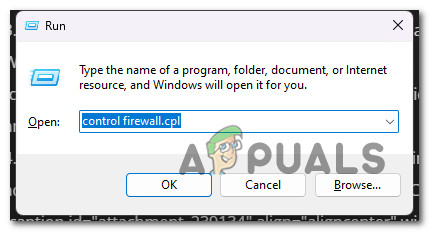
Access the Firewall settings menu - Next, select Allow an app or feature through Windows Defender Firewall from the menu on the left.
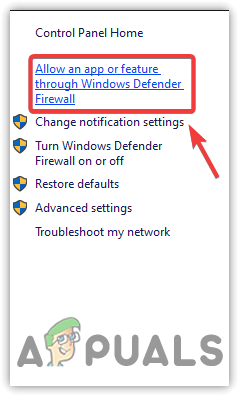
Accessing the Firewall Whitelisting menu - From the Allowed apps menu, click the Change settings option and then click Yes when prompted by UAC (User Account Control) to grant administrative access.
- Once you’ve obtained the necessary rights, scroll through the list of permitted programs and see if you can locate any Game Guard entries.
- If there are no GameGuard entries, select Allow another app, then click Browse, locate their location, and add the Game Guard executables from the game’s installation folder.
- Save the modifications, restart your computer, and the problematic game again to see if the 114 error has been fixed.
6. Prevent interrupting programs from causing the error (applicable)
Besides Antivirus and firewalls, GameGuard is also known to conflict with a wide array of other applications.
Game tracking services, some legacy games (running concurrently), video playback programs, macro assigning software, controller mapping software, and other anti-hack software or emulator software can all collide with GameGuard if they are running at the time when the main GameGuard service is started.
To make it easier for you, We’ve made a list of programs that might cause the 114 error with GameGuard:
Game Tracking devices:
XFire, Raptr, Bandicam, Team Speak, OVerwolf, Game Tracker
Legacy Games:
Any legacy game from the Steam library or GOG
Video Players:
VLC, BS Player, GOM Player, Real Player, KMP Player, DivX, XMBC Media Center, UniConverter, MPC
Macro Assigning Software
Razer Synapse, X-Mouse Button Control, OpenRGB, SteerMouse, Key Manager, Linear Mouse
Controller Mapping Software
Joy 2 Key, X-Pad, Xpadder, J2K, xbpxdrv
Anti-Hack Software
X-Trap, HackShield, Easy Anti-Cheat, BattlEye, Game Enforcer, Hackuna
Emulator software
VMware, KVM, Proxmox, VirtualBox, Xen Project, Hypervisor, Proxmox
If you have any of the tools mentioned above installed on your PC, make sure you prevent them from colliding with GameGuard by following the instructions below:
- Press Ctrl + Shift + Esc to open up Task Manager.
Note: If you’re still on Windows 10, the simple interface will open by default. In this case, click on Show more details. - Next, go to the Processes tab and end every process that might be colliding with Game Guard by right-clicking each and choosing End Process from the context menu.
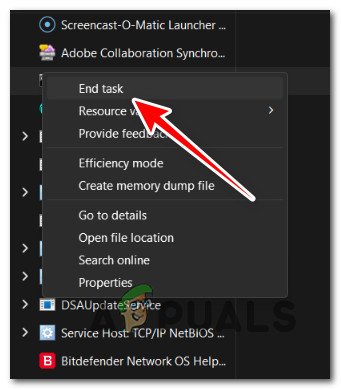
Ending the Task - Repeat this action with every process that belongs to one of the apps mentioned above.
- Launch the problematic game once again and see if the issue is now fixed.
Note: Keep in mind that there might be other 3rd party programs or games that will still collide with the anti-cheat engine and are not mentioned above. To ensure that no 3rd party service is causing this problem, achieve a clean boot state and launch the game once again.
7. Delete the GameGuard folder
If the problem lies within the local files used by GameGuard, you can simply delete the main GameGuard folder inside the game installation folder. This is confirmed to be effective by a lot of gamers that we’re experiencing the 114 error with MMOs like Elsword that we’re launched through a launcher like Steam or GoG.
Note: Because GameGuard is an integral part of the game, every launcher will check for the anti-cheat dependencies and regenerate them if needed.
So if the game that throws the ‘Initiatialization error 114’ is launched through Steam, GoG, Epic Games, EA Play or HumbleBundle, follow the instructions below to delete the Game Guard folder:
Important: If you don’t launch the legacy game through a launcher, deleting the Game Guard folder will likely force you to reinstall the game. (follow the next methods for instructions)
- Press Windows key + E to open up File Explorer.
- Use the navigation bar at the top to navigate to the game installation folder. For Elsword, the default location is:
Hard Drive > Program Files (x86) > Steam > steamapps > common > Elsword
Note: If you’re not using Steam or you’re using a custom location, navigate there instead.
- Once you arrive inside the correct location, delete the GameGuard folder.
- Reboot your PC and launch the game that was triggering the 114 error to see if the problem is now fixed.
Note: At the next game startup, the game’s launcher will detect that a folder is missing and re-download it again. If this does not happen automatically and you get a different error, trigger an integrity check.
8. Perform an AV scan & reinstall the affected game/s
If you’re experiencing this issue with a legacy game, it’s possible that some game files have been quarantined by the security suite and are now missing from the installation folder.
Although this might happen due to a false positive, you should always assume that you’re dealing with a threat first.
Other users dealing with this problem have managed to fix the issue by performing an AV scan before reinstalling the affected game from the Programs and Features menu.
Note: Our recommendation is to deploy a deep scan with Malwarebytes even if you already have a premium subscription to an AV suite. This will help you eliminate any adware that might be producing this issue.
Here’s what you need to do:
- Start by performing a system-wide scan with your active antivirus and follow it up with a deep Malwarebytes scan.
- Press Windows key + R to open up a Run dialog box.
- Type ‘appwiz.cpl’ then press Ctrl + Shift + Enter to open up the Programs and Features with admin access.
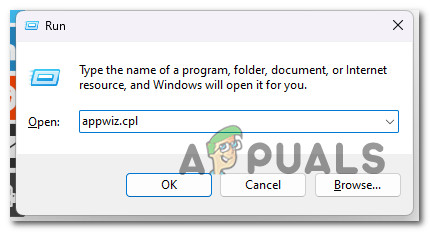
Open up the Programs and Features menu - At the User Account Control (UAC), click Yes to grant admin access.
- Inside the Programs and Features menu, cycle down the programs and right-click on the game that you want to uninstall.
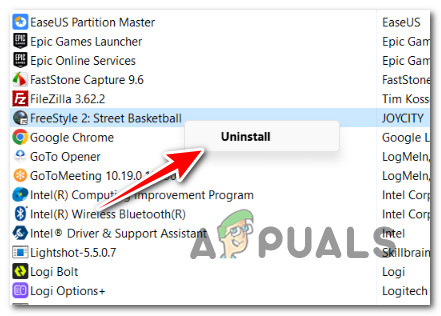
Uninstall the problematic game - Click on Uninstall, then follow the on-screen prompts to complete the uninstallation.
- Reinstall the game via the dedicated launcher (or installer) to have the GameGuard anti-cheat engine installed alongside it.
- Launch the game again and see if the 114 error has been fixed.




